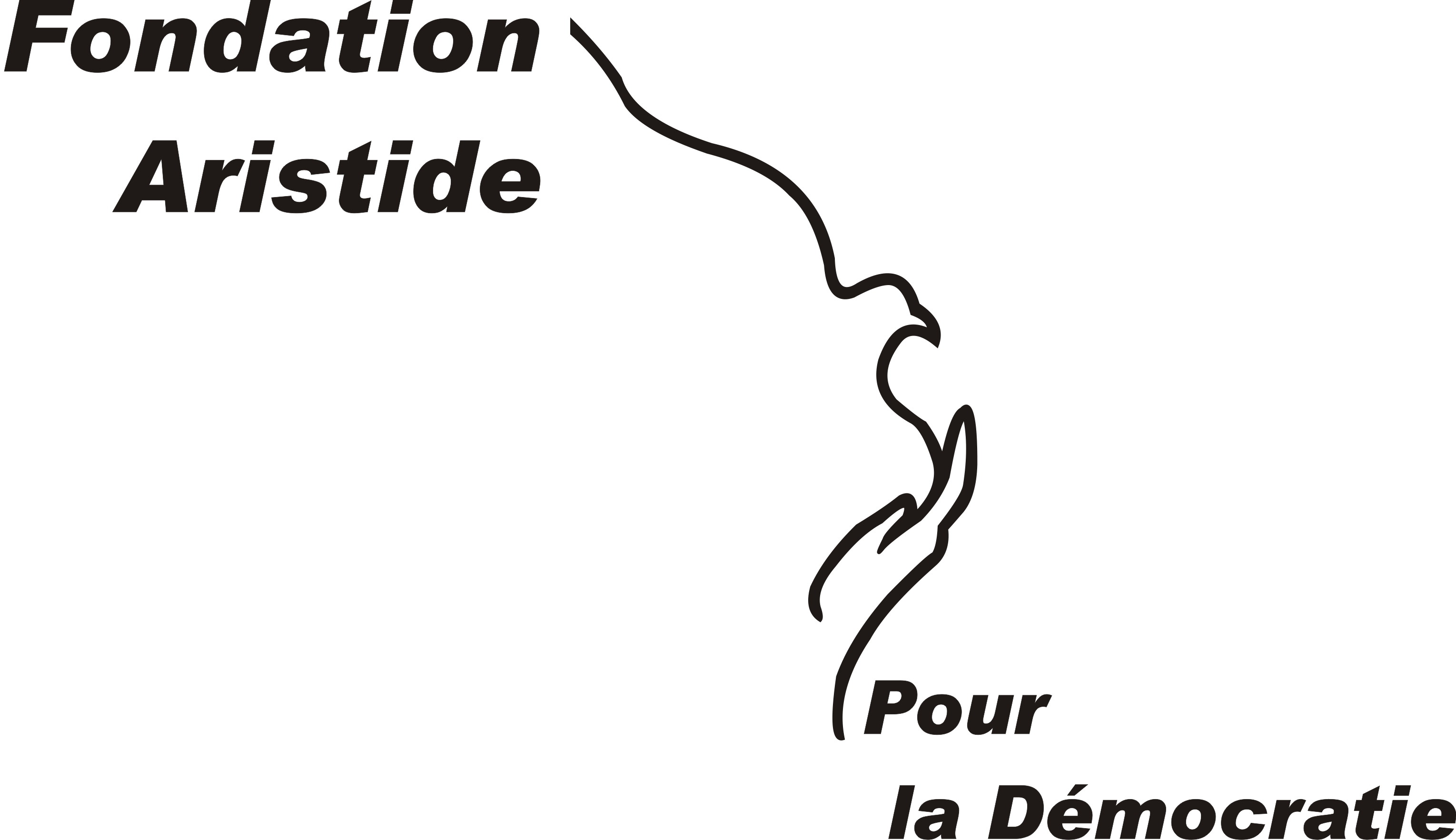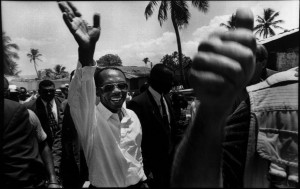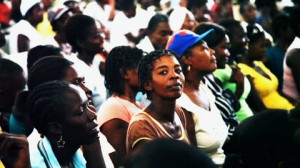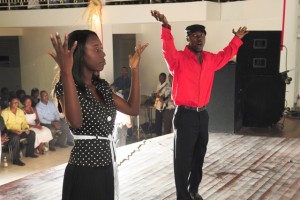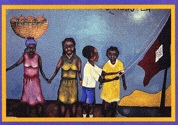Soulaje Lespri Moun
by Laura Flynn
On May 20th I sat down with ten young recently trained lay mental health-workers in the Aristide Foundation for Democracy’s Soulaje Lespri Moun project, to hear how the new project was going. In April these young people received training from a group of social workers from the University of Michigan. (Read an Account of this work by Leah James on the Huffington Post)
For the past eight weeks they’ve have been conducting mental health sessions in two refugee camps in Port-au-Prince. On the day we met in the courtyard of the foundation one-by-one they raised a hand to offer some testimony about the work they were doing.
Most described an initially rough reception in the camps, where most people in Port-au-Prince are still living in conditions that can only be described as inhuman. People are hungry and understandably skeptical about a project that offers mere words. Over time the Mental Health Workers had made inroads, and some of the people who had initially been most skeptical were now regulars at the sessions, or regularly brought new people to participate. Several told stories about people who were drinking or doing drugs to escape the grief and the trauma, and who had came back to say they’d stopped, they would come to talk instead. Many, many people returned to tell them they slept better after participating in the sessions, and after doing the regular breathing and self-soothing exercises that are a key component to the trainings. Some participants reported headaches or body aches were eased, and many people described improved relations with their families.
One woman who came to a session had been estranged from her husband since the quake. Part of the instructions in the mental health workshop is to go home and do the relaxation exercises with your family each night. Despite the estrangement, this woman had taken the direction to heart and so sought out her husband in the camp were both were living. She taught him the breathing and relaxation exercises she had learned – this in turn led to a reconciliation, which was then celebrated by the whole camp.
One common reaction to the trauma of the quake, which the Mental Health Workers call attention to, is difficulty in showing affection. One of the young Mental Health Workers described how as they came to this part of the training a woman had nodded in amazement and said, “It is like you are describing me.” She had been having a terrible time with her daughter, who had been misbehaving since the quake. But she also realized she herself had been distant, and unaffectionate with the child. She came back two days later to tell them that she had spent time with the child, rocking her and putting her to bed that night. Since then the child’s behavior had dramatically improved; she was, once again, the sweet, helpful child she’d been before the quake.
One of the young Mental Health Workers told me she never imagined she could do something like this. The work was hard. And the suffering she’d encountered in the camps she would never forget. But it had transformed her. She was much stronger than she’d imagined she could be. She described an encounter with a woman who had lost her only child in the quake. This woman had heard her daughter’s calls from under the rubble, but she had not been able to save her. She no longer wanted to live—the daughter had represented her only hope in life. The Mental Health Workers did not know what to do. They themselves overwhelmed with emotion on hearing this story and bearing witness to this women’s pain, though they struggled not to show it. “All four of us who were there, we just put our hands on her and repeated over and over, you are alive, you are alive. That was the most powerful experience of my life.”
I was struck by how seriously all the staff at the Foundation took the relaxation exercises, which they had learned in sessions conducted at the AFD in the two month after the quake. I asked what they thought of the training they’d received. Was it all talk? No, no several of them assured me, they did they exercises religiously, every night with the children and partners. Especially the butterfly hug, one staffer told me, wrapping her arms around herself, a look of calm coming over her face as she did it — she especially liked the butterfly hug.
Gladys Delouis, a long time staff member of the AFD who I’ve known since 1996 told me that the night after the first workshop she did with Leah was the first night she was able to sleep inside her house. Her house was not damaged, but like nearly everyone in the city, she’d been sleeping in a tent outside out of fear of another quake. She decided to go inside, because “you have to live.” She also told me that she was able after the training to go downtown in the area of the Palace of Justice, where she had been having her hair done at the moment of the quake. The Palace of Justice completely collapsed, taking the beauty shop she was in with it. She scrambled to get out – she made motions with her elbows, pushing forward, as if she were crawling, to show me how. Somehow she escaped the building. Just that past week Gladys had learned that the woman who had been sitting in the next chair next to her having her hair done, had been killed. Gladys told me that before the workshop each time she had approached the area around the Palace of Justice, she’d veered away. After the session she went back and took a good look at the place she had been. She still didn’t know how she got out.
Perhaps of all the stories I heard Frederick’s was the most inspiring. Frederick was not technically a member of the Mental Health Worker team. Solon, the psychologist who is mentoring the young mental health workers had asked him to come help translate for Leah James during the trainings back in April, because Frederick is a language professor. But it turned out Solon had a secondary reason for inviting him — he knew Frederick was suffering as well. Frederick, whose face I can only describe as radiant, began by saying, “You know when I first came to the training I was not well. That first day I could not even translate. For weeks after the quake I was not myself.” Frederick went on to tell his own story. At the moment of the quake he had been in a classroom teaching at the college where he worked. The entire building had collapsed and over two hundred people died there including many of his students in his classroom, colleagues and the beloved dean of the school, Frederick’s mentor and role model. He had witnessed these deaths and somehow escaped.
In April as schools were reopening he was called on to go back to teaching. He did not know if that was possible, because he was not functioning well, and because since he had been in the classroom at the moment of the quake, teaching would be to reenact the trauma. But, he said, the time he spent in the trainings, following the work of the Lay Mental Health workers, doing the relaxation exercises, and talking with Solon, had brought him back to himself. He reported that he was now back teaching, in the ad hoc facilities that the college had created. And what is more every day when he taught he led his students through the relaxation exercises. The students, in turn, took the exercises home to their families. Frederick was now an adopted member of the Lay Mental Health Worker group, and perhaps its biggest evangelist.
The conditions of life for those who survived the quake are terrible. They need food and they need shelter. But there is also a deep hunger for healing the psychological wounds of this quake. For this reason project Soulaje Lespri Moun is having a strong multiplier effect — the skills and information are being passed on to many more people than the Mental Health Workers are able to reach in person.
We hope you will join us in keeping this work going.
If you would like to support this work tax-deductible donations can be made here:
Or mail checks to: Aristide Foundation, PO Box 490271, Key Biscayne, Florida 33149
All donations are tax deductible and will be acknowledged.
For more information on the the Lay Mental Health Worker Project and on volunteer opportunities for international mental health professionals wishing to support this project please visit: http://mentalhealthhaiti.wordpress.com/




